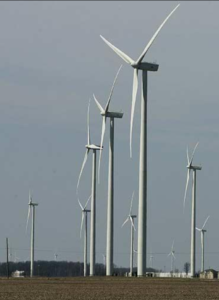One Ohio Senate and three Ohio House of Representative candidates joined four area business entrepreneurs Sept. 25 to discuss their political positions on solar, wind, biomass, fossil fuel and nuclear energy projects. These projects were offered as solutions to establishing the best clean and alternative energy technologies for the state’s economy at the “Ohio Clean Energy Economy Meet the Candidates” forum at the University of Toledo’s Scott Park Campus auditorium.
The 90-minute panel discussion addressed how Ohio in general, and the northwest area of the state specifically, would best be served by its elected officials in meeting Senate Bill 221’s (SB221) requirements. SB221 says utility companies that do business in Ohio secure 12.5 and 25 percent of all their energy from clean and alternative energy technologies, respectively, by 2025. The remainder of energy in Ohio is derived from coal, oil and natural gas.
The Ohio legislature defines clean energy sources to include solar, wind, biomass, geothermal and hydroelectric energies. Alternative energy sources are defined to also include nuclear power.
And this is the area in which the four candidates in attendance — incumbents Randy Gardner (Republican, Senate District 2) and Matt Szollosi (Democrat, House District 46), and first-time candidates Jeff Bunck (Democrat, House District 47) and Dave Kissinger (Republican, House District 46) — differed most dramatically.
Bunck, who retired from teaching high school social studies after a 35-year career, describes himself as a lifelong environmental activist who strongly supports SB221, clean energy technologies and energy conservation. Bunck was the only candidate to receive applause for his proposals to a room of more than 60 UT students, faculty and staff members and local businessmen.

Gardner, a House representative who touted his role in passing SB221, noted that he holds the same energy positions as presidential candidates Barack Obama and Mitt Romney. He said Ohio, and the nation, must continue to utilize coal and oil as energy sources in addition to solar, wind and other clean energy technologies currently in the research and development stages.
Kissinger, a retired registered nurse with a military career that included monitoring the radiation levels of shipmates at sea for six- to 12-month deployments, is a firm believer in the “absolute” safety of nuclear energy. He is an outspoken advocate for legislating subsidies for Ohio energy companies research and development of nuclear power to meet SB221’s requirements.
Szollosi, a House incumbent who represents citizens of Jerusalem Township, Oregon and West Toledo, followed Gardner example in describing how hard he worked to pass SB221. Szollosi also took the opportunity to point out additional work in the Ohio legislature when he congratulated business participants Al Compaan (Xunlight 26 Solar), Praveen Paripati (SuGanit Systems, Inc.), Aaron Valentine (Emersol) and Keith Walters (One Energy, LLC) for taking advantage of some of the legislation he said he was instrumental in passing in past years.
Support for subsidies
All four candidates said they would support subsidies for the development of offshore wind energy projects on Lake Erie with one qualification. Bunck said his support was contingent upon a guarantee that Lake Erie’s “many other uses, including recreational fishing and boating, would not be ignored or lessened because of its use for wind energy R&D.”
Subsidies to the coal industry, fracking operations and the Davis-Besse nuclear power plant in Oak Harbor did not receive the same kind of support wind energy enjoyed.
Gardner said he would demand the legislature keep coal and oil in the debate when the Senate “scrutinizes all government involvement in the subsidizing of businesses.” Szollosi’s biggest concern was not eliminating coal from the discussion because, he said, “We’re in a period of transition, and there are a lot of people in Ohio whose livelihood is tied to coal production, including the producers themselves and construction workers as two examples.”
Bunck jumped on Szollosi’s use of the word “transition” to discuss the U.S.’s need to transition from coal to “clean, natural energy,” a discussion of climate change and “our obligation to protect the future of our grandchildren.”
Kissinger told stories about his experiences as an RN in the armed services to tell the audience that the “health care of pollution is near and dear to my heart and I will do everything to ensure the ongoing reduction in pollution” as a legislator.
The discussion of Republican Gov. John Kasich’s interest in fracking did not follow party lines. Szollosi, a Democrat, agreed with Gardner that the jobs the natural gas industry has created with fracking have boosted Ohio’s economy and “had a significantly positive effect on the economies of northern and eastern Ohio, especially the Appalachian area.”
It was at this point the audience applauded Bunck’s rebuttal to Szollosi when he condemned companies’ drilling practices. Bunck said that as long as a drilling company “declares what they use is a trade secret, they don’t have to report what chemicals they put into the ground when they frack. They can legally throw the records away after two years, and we will never be able to hold them financially responsible if the people who live in the region develop health problems.”
Bunck said that, as a legislator, he would demand the government require more transparency in the fracking procedure and that “trade secrets have to go.”
The discussion of Davis-Besse gave Bunck an opportunity to question the legislature’s wisdom in subsidizing nuclear power R&D when the cost of energy is about $114 per nuclear megawatt and only $50 per wind megawatt.
Bunck said any subsidizing of nuclear energy should explore the safety issue, citing the near catastrophe at Three Mile Island as a warning to what could happen in Oak Harbor.
Szollosi, his fellow Democrat, disagreed, saying that since the nuclear industry “is very heavily regulated and there is full and complete transparency in everything they do, I have confidence that this facility is being very closely monitored.”
Gardner said he would support keeping nuclear power a part of the state’s energy program because “it seems to have bipartisan support in both the Senate and the House.”
Kissinger again told stories of his experiences as an RN in the service as a way of leading into his position of being “very pro-nuclear power. It is a great source of energy, and I would support any legislation that would foster the growth of nuclear energy.”























